Together, Determined In Des Moines

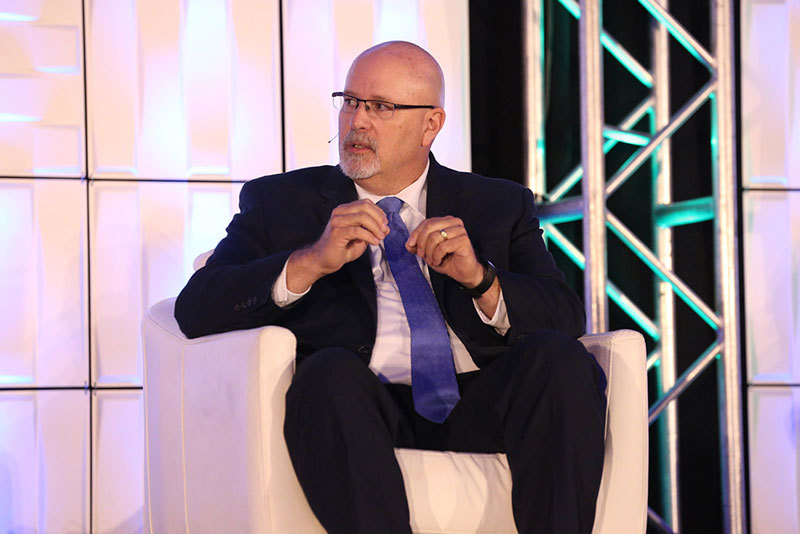


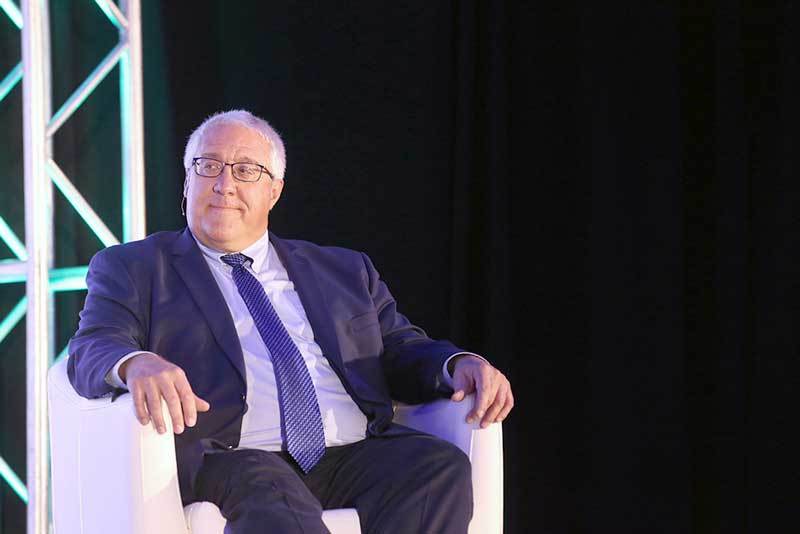

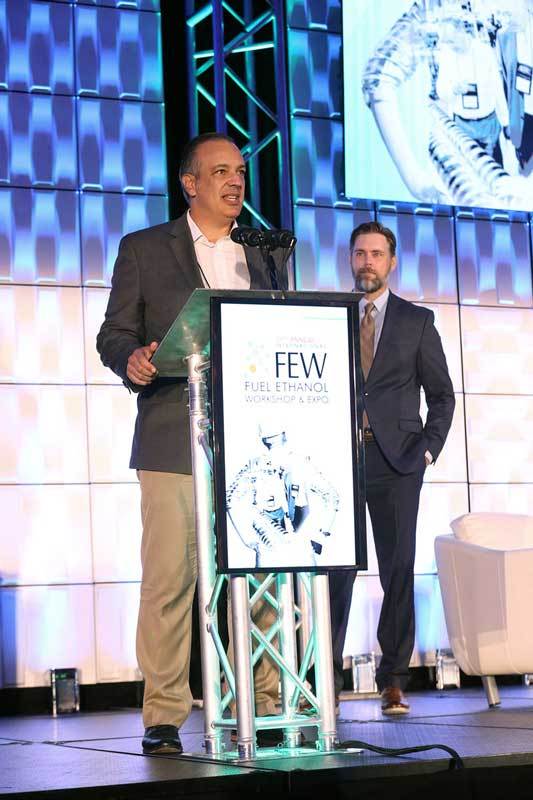

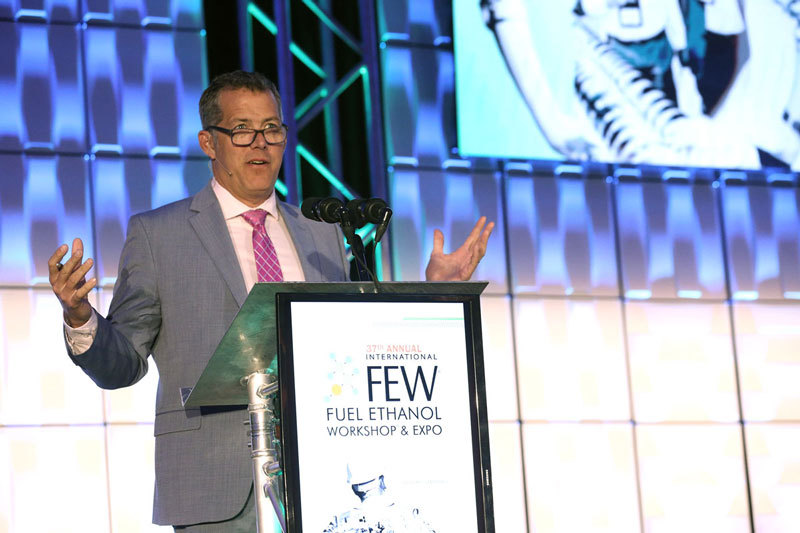



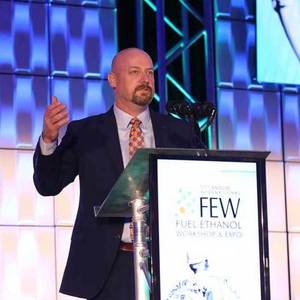
BBI
August 19, 2021
BY Susanne Retka Schill
After more than a year of virtual meetings throughout the ethanol industry, the energy at the 37th annual International Fuel Ethanol Workshop & Expo was palpable as colleagues met in person July 13-15 in Des Moines, Iowa.
In his keynote remarks at the opening session July 14, Renewable Fuels Association President and CEO Geoff Cooper addressed two recent court rulings that threatened to dampen the enthusiasm, assuring the attendees that although discouraging, “both decisions will prove to be hollow and short-lived victories for oil refiners who remain intent on keeping ethanol in an E10 box. These decisions are temporary setbacks.”
Three weeks before the FEW, the Supreme Court overturned a key piece of the Tenth Circuit Court’s landmark ruling on small refinery exemptions (SRE), Cooper explained, ruling that refiners can petition for an exemption from Renewable Fuel Standard obligations, even if they have not received an exemption previously.
A week after the SRE decision, the D.C. Circuit Court sided with oil refiners and said the U.S. EPA had exceeded its authority by giving E15 the same volatility waiver that is provided to E10, potentially reinstating the summertime ban on E15 in conventional markets.
“The courts have had their say,” Cooper said, adding the next moves are up to the Biden administration. “In both cases, EPA has the tools available to lock in long-term growth opportunities and provide marketplace certainty.”
The Supreme Court may have overturned one aspect of the Tenth Circuit’s decision on SRE’s, he said, but it did not comment on the Tenth Circuit court ruling that refiners asking for exemptions must prove economic hardships were caused solely by the RFS. “Second, the court underscored that refineries of all sizes pass through their RIN costs to the wholesale prices for their refined products, meaning it will be next to impossible for them to establish that the RFS itself has somehow harmed them.”
The E15 ruling, does not mean retailers selling E15 in conventional gasoline markets this summer must stop, Cooper said, because the current E15 rule should remain in force as the appeals process plays out “and there will be appeals.”
Cooper addressed another arena that many in the industry consider a potential threat—the drive towards electric vehicles (EVs). “Some apparently believe that mandating the sale of electric vehicles is the one and only solution for decarbonizing our transportation system,” he said. Discussions about decarbonizing the transportation sector need to be grounded in reality, since one cannot flip the U.S. vehicle fleet overnight. The Energy Information Administration projects that liquid-fueled internal combustion engines will still account for 80% of new automobile sales in 2050. However, three weeks after the FEW, the Biden administration unveiled a new national target for electric vehicles, calling for them to represent half of all new vehicle sales by 2030.
“We have an enormous opportunity to decarbonize liquid fuels now with ethanol, which is essentially a liquid form of solar energy,” Cooper said. We are on our way to get to net-zero with ethanol through using biogas, adopting carbon capture and sequestration and proper accounting of soil carbon accumulation in cornfields. “But it’s going to take smart policy to get us there, policy that puts an economic value on carbon reduction,” he said, continuing on to talk about the growing interest in adopting clean fuels policies in states or even a national low carbon fuel standard.
Other association leaders reinforced Cooper’s message in the panel session that followed the keynote. Clean fuels policy has dominated the work at the American Coalition for Ethanol, CEO Brian Jennings said. If the policy is truly technology neutral, “ethanol comes out as a winner. Carbon markets could increase the demand and price for ethanol, but we have to get the policy right.”
For a clean fuels standard (CFS) to truly benefit the ethanol sector, Chris Bliley, senior vice president of regulatory affairs at Growth Energy, said there must be a path forward for higher blends. “If you have a performance standard that gets tighter and tighter, but you have no room for growth in the market place, it’s sort of a dead end.”
Troy Bredenkamp, senior vice president government and public affairs at the RFA, also discussed the importance of a technology neutral CFS. The Biden administration is setting very ambitious carbon goals, he said, stressing that ethanol is a solution that can deploy very quickly if the policy is developed in the right way. “The sky is the limit, I think, if that policy gets done correctly,” he said.
A potential national CFS isn’t the only federal policy ethanol groups are working to shape. The EPA is also scheduled to develop post-2022 regulations for the RFS. Bliley said Growth Energy sees an opportunity with that RFS “reset” rule, although there is also a bit of fear and caution. Big Oil is expected to lobby heavily for changes that would benefit fossil fuels, he said. However, there is also tremendous opportunity for biofuel industry to lobby the agency to better recognize the carbon reduction attributes of renewable fuels.
Producer Reaction
In the producer panel that followed in the general session, three industry leaders were asked for their reaction to the messages from the association leaders.
“Without good policy, we can’t operate,” said Mick Henderson, general manager of Commonwealth Agri-Energy, Hopkinsville, Kentucky. “As one of my board members says, if you’re not at the table, you’re on the plate.”
“I wish we weren’t quite as dependent on policy and could create more demand,” said Walt Wendland, CEO of Ringneck Energy, Onida, South Dakota. “I hope we can expand exports.”
“I was encouraged, by the idea of ethanol plants taking the lead in net zero,” said James Broghammer, CEO of Pine Lake Corn Processors, Steamboat Rock, Iowa.
Each of the producers spoke of ways they are working to improve efficiencies and respond to changing markets. Pine Lake Corn Processors has reduced natural gas and improved efficiencies every year since starting up in 2005. Currently, the company is investing in improvements to push their corn oil yields to 1.25 pounds per bushel of corn processed, Broghammer said.
“With corn prices more than doubling, efficiency has been our focus,” Wendland said, explaining that with Ringneck being a new plant built with current technologies, the work has mostly been in process improvements such as fermentation timing and temperature staging.
During the pandemic, Henderson said Commonwealth quickly pivoted to supplying ethanol for hand sanitizer to multiple craft distillers in Kentucky that had shut down. With that experience of upgrading distillation for hand sanitizer, the company has decided to further upgrade to do grain neutral spirits.
For Pine Lake Corn Processors, the impact of the pandemic came in three phases, Broghammer said. “When the country shut down, ethanol was deemed an essential industry but we quickly saw nobody was on the road.” The plant ran at half rate for a month before demand started to return. In the second stage, COVID hit the region and after one wedding everyone on one shift tested positive. “The employees stepped up,” he said, picking up different roles as needed, such as mechanics becoming operators. In the third phase, the hiring process for hourly people has become very difficult. “The employees are not there to hire,” he said. “We’ve had an an open position for eight months, and see people hired away by John Deere.”
Being located in a manufacturing area in Kentucky, Henderson agreed that the competition for good employees is stiff. “You’ve got to raise wages and compete for being a good place to work.”
Award Winners
Alongside the policy discussions and producer panel at the opening session, Steve Markham and Kurt Rosentrater, were recognized for their contributions to the ethanol industry (see page 32).
Markham, director of risk, global grain and processing at CHS, received the High Octane Award, which acknowledges a person who has helped the industry progress over time. Starting in 1984, Markham has worked to develop distillers grains markets, pioneering the practice of third-party marketing and playing a role in developing rail and barge transportation as demand grew.
Rosentrater, executive director and CEO of the Distillers Grains Technology Council and associate professor at Iowa State University’s Department of Agriculture and Biosystems Engineering, received the Award of Excellence, which recognizes individuals who have made significant contributions to the fuel ethanol industry through their research, technical advisory and/or development activities.
For nearly 20 years, Rosentrater’s research has helped overcome challenges and improved utilization of distillers grains, improving handling and storage of the coproduct. He was the first to develop a commercially viable method to pelletize 100 percent DDGS. He has also helped develop new market opportunities for distillers grains in aquaculture.
Just over a quarter of the nearly 2,000 attendees at the 2021 FEW were biofuel producers representing 74% of U.S. ethanol plants, 16% of Canadian ethanol plants and 30% of U.S. biodiesel plants. Separate tracks focused on biodiesel and biomass topics alongside the usual ethanol tracks covering production, operations, coproducts, product diversification, leadership and financial management.
FEW attendees represented 45 U.S. states, five Canadian provinces and 22 countries, in spite of Covid-19 restrictions preventing travel for many. The overflow expo hall hosted 300 exhibitors, larger than the 2019 pre-pandemic show and overall attendance was at par with recent FEW events.
The dates and location for the 38th International Fuel Ethanol Workshop and Expo next year were announced: June 13-15 in Minneapolis.
Author: Susanne Retka Schill
Questions: editor@bbiinternational.com
Advertisement
Advertisement
Related Stories
The Michigan Advanced Biofuels Coalition and Green Marine are partnering to accelerating adoption of sustainable biofuels to improve air quality and reduce GHG emissions in Michigan and across the Great Lakes and St. Lawrence Seaway.
Sen. Roger Marshall, R-Kan., and Rep. Marcy Kaptur, D-Iowa, on April 10 reintroduced legislation to extend the 45Z clean fuel production credit and limit eligibility for the credit to renewable fuels made from domestically sourced feedstocks.
Representatives of the U.S. biofuels industry on April 10 submitted comments to the U.S. Department of Treasury and IRFS providing recommendations on how to best implement upcoming 45Z clean fuel production credit regulations.
EIA reduces production forecasts for biobased diesel, increases forecast for other fuels, including SAF
The U.S. Energy Information Administration reduced its 2025 forecasts for renewable diesel and biodiesel in its latest Short-Term Energy Outlook, released April 10. The outlook for “other biofuel” production, which includes SAF, was raised.
FutureFuel Corp. on March 26 announced the restart of its 59 MMgy biodiesel plant in Batesville, Arkansas. The company’s annual report, released April 4, indicates biodiesel production was down 24% last year when compared to 2023.
Upcoming Events










